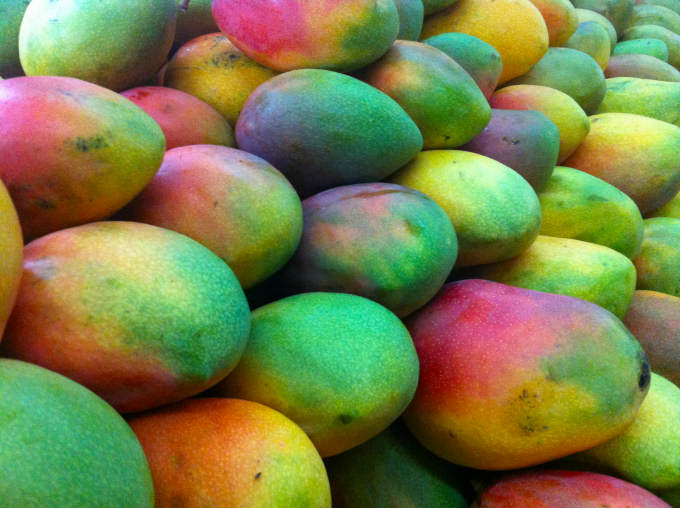
Orlando, Florida (September 7, 2016) – Research published in the Journal of Nutrition has for the first time documented the potential effects of mango consumption on gut microbiota of mice.1 When samples were compared from the beginning to the end of the study period, mango supplementation was found to prevent the loss of beneficial gut bacteria often induced by a high-fat diet. This is an important finding as specific bacteria in the intestinal tract may play a role in obesity and obesity-related complications, such as type 2 diabetes.2
In this study, published in the Journal of Nutrition, 60 male mice were assigned to one of four dietary treatment groups for 12 weeks – control (with 10% of calories from fat), high fat (with 60% calories from fat), or high fat with 1% or 10% mango. All high-fat diets had similar macronutrient, calcium, phosphorus, and fiber content.
“Fiber and other bioactive compounds in plant-based foods are suggested to prevent gut dysbiosis caused by a high-fat diet,” said Edralin A. Lucas, Ph.D., professor of nutritional sciences at Oklahoma State University and lead researcher of the study. “Mango is a good source of fiber and has been reported in previous studies to have anti-obesogenic, hypoglycemic and immunomodulatory properties. The results of this animal study showed that adding mango to the diet may help maintain and regulate gut health and levels of beneficial bacteria levels. Further research is necessary to see if these study results can be replicated in humans.”
In previous studies, Bifidobacteria, for example, has been found to be lower in both obese individuals and those with type-2 diabetes.3 Similar results have been observed with Akkermansia in animal studies.4 High-fat diets have been linked to gut dysbiosis, or bacterial imbalances within the intestinal tract.
The high-fat dietary treatment with 10% mango (equivalent to 1½ cups of fresh mango pieces) was found to be the most effective in preventing the loss of beneficial bacteria from a high-fat diet without decreasing body weight or fat accumulation. Specifically, mango supplementation regulated gut bacteria in favor of Bifidobacteria and Akkermansia and enhanced short-chain fatty acid (SFCA) production. SCFAs have been shown to possess a wide range of beneficial effects, such as anti-inflammatory properties.5
One cup of mango is bursting with antioxidants and over 20 different vitamins and minerals and provides a good source of fiber. While it has been well-documented that compounds in mango exhibit anti-inflammatory activities and that fiber aids digestion, the effects of mango on the gut microbiota have not previously been investigated.
Although more research is needed on the effects of mango on human health, this study suggests that mango consumption may be important in improving gut health particularly for those consuming a high-fat diet.
###
About National Mango Board
The National Mango Board is an agriculture promotion group supported by assessments from both domestic and imported mangos. The board’s vision, to bring the world’s love of mangos to the U.S., was designed to drive awareness and consumption of fresh mangos in the U.S. marketplace. One cup of the superfruit mango contains 100 calories, 100% of daily vitamin C, 35% of daily vitamin A, 12% of daily fiber, and an amazing source of tropical flavor. Learn more at mango.org.
1. Ojo, B., El-Rassi GD, Payton ME., Perkins-Veazie-P., Clarke S., Smith BJ., Lucas EA., Study: Mango Supplementation Modulates Gut Microbial Dysbiosis and Short Chain Fatty Acid Production Independent of Body Weight Reduction in C57BL/6 Mice Fed a High Fat Diet. Journal of Nutrition. 2016; 146 (8): 1483-91
2. Flint HJ, Scott KP, Louis P, Duncan SH. The role of the gut microbiota in nutrition and health. Nature Reviews of Gastroenterolgy & Hepatolgy 2012;9:577-89. http://www.ncbi.nlm.nih.gov/pubmed/22945443
3. Schwiertz A, Taras D, Schäfer K, Beijer S, Bos NA, Donus C, Hardt PD. Microbiota and SCFA in lean and overweight healthy subjects. Obesity 2010;18:190-5. http://www.ncbi.nlm.nih.gov/pubmed/19498350
4. Everard A, Belzer C, Geurts L, Ouwerkerk JP, Druart C, Bindels LB, Guiot Y, Derrien M, Muccioli GG, Delzenne NM. Cross-talk between Akkermansia muciniphila and intestinal epithelium controls diet-induced obesity. Proceeding of the National Academy of Sciences 2013;110:9066-71. http://www.ncbi.nlm.nih.gov/pubmed/23671105
5. Fung KY, Cosgrove L, Lockett T, Head R, Topping DL. A review of the potential mechanisms for the lowering of colorectal oncogenesis by butyrate. British Journal of Nutrition 2012;108:820-31. http://www.ncbi.nlm.nih.gov/pubmed/22676885
Media Contact
McKenzie Hall Jones, RDN
[email protected]
818-469-7053
http://www.wildhive.com/#/
The post Mango and the microbiota: Potential role of this superfruit in maintaining gut health appeared first on Scienmag.





